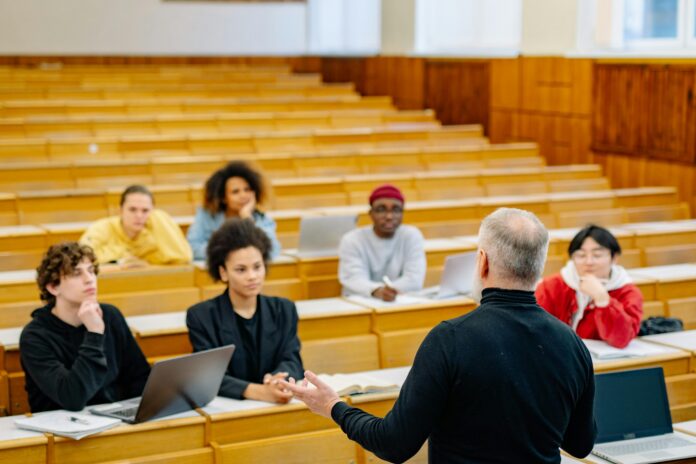In the fight against gender-based violence, schools are often seen as the frontline battlegrounds where the war on misogyny can be won. They are the places where young minds are shaped, where attitudes and beliefs can be moulded for the better. Yet, despite their potential as havens of equality and respect, Australian classrooms are increasingly becoming hotbeds of misogyny and disrespect, leaving educators and experts deeply concerned.
The escalating culture of misogyny in Australian classrooms is not just a matter of concern; it’s a clarion call for immediate action. Patty Kinnersly, CEO of Our Watch, has been vocal about the urgency of implementing respectful relationships education, especially in light of the alarming spike in homicides in 2023. In her op-ed for the Canberra Times, Kinnersly emphasised that there’s no room for debate on whether such education should be a priority. The cost of delay is too high, with young women not only experiencing violence but, in the most tragic cases, losing their lives.
You May Like
Victoria stands alone in its mandate for Respectful Relationships education in government schools, a program introduced in 2016. The state has embarked on a mission to achieve the ‘whole-of-school’ model, a comprehensive approach to prevention education that Our Watch and others believe is the most effective way to combat violence and foster respectful relationships.
Imagine a school that operates as a microcosm of gender equality, where policies and procedures are gender-equal, and where teachers and leaders actively reject rigid gender norms and promote equality and respect. This vision of schools as gender-equal microstates is not just a lofty ideal; it’s a practical model that could have a ripple effect beyond the school gates, influencing the norms and attitudes of the entire community.
However, the reality on the ground is far from this ideal. Government schools are grappling with significant challenges, including teacher burnout, underfunding, and a disturbing rise in violence and misogyny. More than 70% of teachers, who are female, are reporting an increase in sexual harassment and misogynistic behaviour from male students. This includes being propositioned, threatened with rape, asked for nude photos, and experiencing sexual moaning during class, even in primary schools.
The Independent Education Union in Victoria has noted a worrying trend of violence against female teachers by students, a situation exacerbated by the mental health deterioration and problematic behaviours that have surged post-Covid lockdowns. Daniel Principe, an educator who works with boys, has observed a decline in attention spans, resilience, and an uptick in sexualised language, which he attributes to excessive screen time and exposure to harmful content during the pandemic.
The nature of sexual violence among young people is also changing, with an average of six incidents of child-on-child sexual abuse reported weekly in Victorian primary schools. High school students are not only engaging in physical exploitation but are also using technology and deepfake apps to create and circulate explicit sexualised images of their peers, as seen in the case of Bacchus Marsh Grammar, a regional private school in Victoria.
Deanne Carson, CEO of Body Safety Australia, highlights the role of media and social media in escalating the likelihood of copycat behaviours and driving them down in age. She also expresses frustration with the way prevention education is funded, as it often fails to address the complex realities within classrooms where children have been raped or have sexually abused others.
The impact of exposure to violent and abusive pornography on young people’s sexual development and behaviour is a significant concern. Professor Michael Salter, director of Childlight at the University of New South Wales, points out that pornography has expanded the sexual vocabulary of children, leading to more extreme acts of sexual violence.
Despite these challenges, there are glimmers of hope. Educators like Principe are witnessing extraordinary insight and empathy from young people, who are more aware of issues like objectification and sexualisation. Moreover, Carson sees young people who are better informed, more assertive, and capable of intervening in problematic behaviours within their peer groups.
The ‘whole-of-school’ model remains the standard for prevention education, but its success is limited. While teacher attitudes have improved, there is little data on whether student attitudes or behaviours have changed. The key to progress may lie in educating parents and engaging them in conversations about gender norms and parenting practices.
The journey to a more respectful and equal society is not utopian; it’s a step-by-step process that starts with one child, one classroom, one school, and one town at a time. As we continue to grapple with the rise of misogyny in Australian classrooms, it’s clear that a collective effort is required to turn the tide and ensure that schools become the safe and nurturing environments they are meant to be.
What are your thoughts on the current state of gender equality in schools? What do you think has changed in education since your school days that has led to misogyny becoming such a prevalent issue today? Feel free to share your perspectives in the comments section below.

